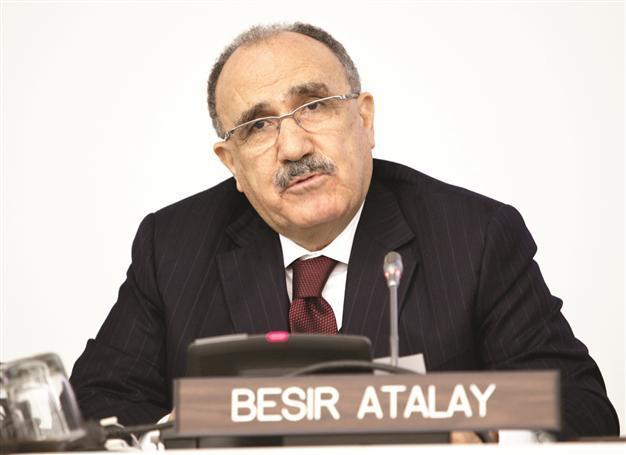Ruling party and BDP ‘again in contact’
ANKARA - Hürriyet Daily News

Deputy Prime Minister Beşir Atalay confirms the contact with the Peace and Democracy Party (BDP), but underlines that the talks are not ‘negotiations.’
Under Prime Minister Recep Tayyip Erdoğan’s “fight against terror, negotiate with its political extension” approach, details of “contact traffic” between the government and the Peace and Democracy Party (BDP) have emerged. The initiative, launched by the government for a solution to the Kurdish issue, was shelved before the election last year and was transformed into “nationalist and security-based” policies. While the government’s stance got tougher, the BDP kept referring to “İmralı and Qandil” for a solution, also tightly shutting the doors of dialogue. However, there are rumors in the corridors of the parliament that, far from the tension at the top, there are again new contacts on the Kurdish initiative.The focus of the talks - which are being held covertly from the public - are the co-leaders of the BDP, Selahattin Demirtaş and Gültan Kışanak. BDP deputy Sırrı Sakık and independent deputy Ahmet Türk are also said to have participated in some talks. For the government, one of the architects of the Kurdish initiative, Deputy Prime Minister Beşir Atalay, is the chief contact. It is also being whispered that Justice Minister Sadullah Ergin and Ömer Çelik, the AKP’s deputy leader, have similarly held contacts with the BDP. Demirtaş has indicated that members of the BDP have met with “ministers,” after securing the approval of their own party assembly.
Minister Atalay confirmed the contacts in the lobby of Parliament, but he also gave this warning: “It is not correct to define these contacts as negotiations.” According to Atalay, “regional issues” are the focus of the talks. He also laid down the condition that the party to be negotiated with should be a “strong interlocutor.” He gives the impression that if the BDP takes initiatives and moves itself away from the “guidance of İmralı and Qandil,” contacts could be elevated to the level of “negotiations.”
Atalay said: “If terror exists, then you have a fight with an active security channel. But, on the other hand, there should be several initiatives used to solve the issue. It has to be viewed from a wide window, not only from the window of security. We have always said that we would recognize it as an interlocutor if a strong political party comes up. We would prefer to negotiate these issues under the roof of Parliament with those who have been elected by the people.”
It is said that topics such as the escalation of violence in the region, the possibility of the outlawed Kurdistan Workers’ Party (PKK) increasing its attacks in spring, the block on Abdullah Öcalan’s lawyers, as well as the recent operations against the alleged urban wing of the PKK, the Kurdistan Communities Union (KCK), have been tackled during the latest contacts.
Demands conveyed by BDP spokespersons to government members can be summarized thus: “The atmosphere has become increasingly strained; there are signs of emotional break up in society. We are ready to take the initiative for a solution. The government should also be active in this process; it has to shoulder its share for normalization. It has to watch its language toward the BDP. It has to end the operations. The isolation of Öcalan should end and he should be allowed to act his role.”
One wing of the BDP, with some pressure from the grassroots, genuinely wants to take the initiative and wants the negotiation process to restart. The hawkish wing, on the other hand, continues to resist, saying: “There will be no negotiations without Öcalan and Qandil.”
The government front also wants to keep the BDP in the game by maintaining contacts, even though it has not launched “full negotiations.” Through such contacts, they hope to prevent the usual rise in clashes during the summer period. It is significant that Erdoğan’s words: “fight against terror, negotiate with its political extension,” have come after all these contacts.
It looks as if the door that was securely shut with the shelving of the initiative is being kept slightly ajar.
All eyes on the constitutional court for Gül
The main opposition Republican People’s Party (CHP) has taken the law on the election of the President to the Constitutional Court. If the court annuls the law, together with the length of term, President Abdullah Gül will serve five years rather than the current seven years. An election will then have to take place by August. Time is ticking and all eyes are on the court. The corridors are bubbling with rumors, because the decision may turn calculations for the 2014 parliamentary election upside down. The questions keep coming: Will Gül run for office for a second term? If Prime Minister Erdoğan wants to ascend to the Çankaya Presidential Mansion, who will lead the Justice and Development Party (AKP)? Will it be Gül, or a name Erdoğan points at? What if Erdoğan ascends to the mansion and Gül does not return? What stance will Bülent Arınç take?
Feyzioğlu TO CHP party assembly?
It is being suggested that the Head of the Ankara Bar, Metin Feyzioğlu, is of not planning to run for office at the bar elections in May. Many believe that Feyzioğlu will become a candidate for the CHP’s party assembly at the CHP congress in June, upon the invitation of party leader Kemal Kılıçdaroğlu. Feyzioğlu is known to have helped draft the CHP statute, and his name is even being suggested for the leadership of the CHP after Kılıçdaroğlu steps down. Known for his “nationalist” stance, Feyzioğlu is the grandson of CHP’s renowned secretary general, Turhan Feyzioğlu.











